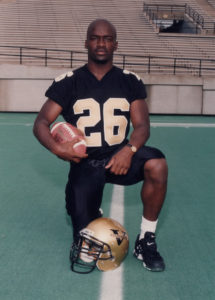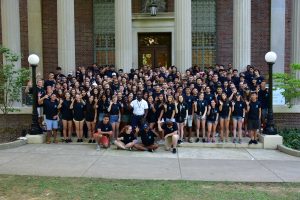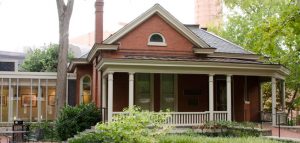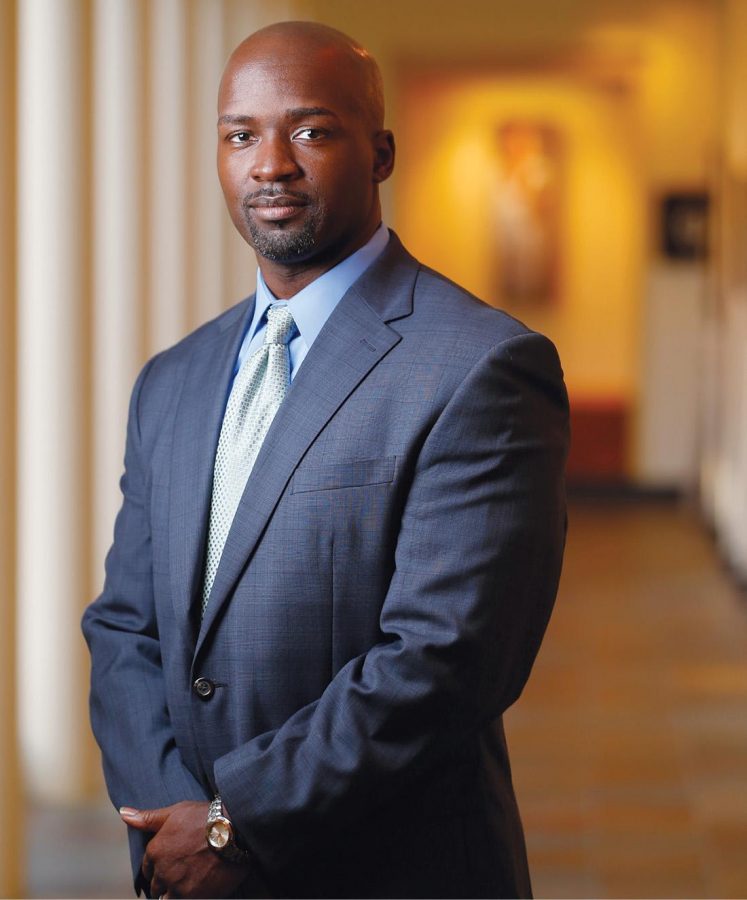Dr. Rosevelt Noble, who completed his Bachelor’s, Master’s and PHD at Vanderbilt, began his journey as an undergraduate in the fall of 1994, and since then made his mark on the University through his leadership and devotion to his work and the Vanderbilt community. On June 1st, he officially began his role as director of the Bishop Joseph Johnson Black Cultural Center.
In addition to directing the BCC, he serves as Assistant Dean of Students, Senior Lecturer in the Department of Sociology and as Faculty Head of Stambaugh House.
“You couldn’t have told me 23 years ago that I would come here as a freshman and still be here,” he said.
Noble finished his undergraduate career in three years and began graduate school in the fall of 1997. He joined the Vanderbilt faculty as a senior lecturer in the sociology department in the fall of 2002. He is also involved in a number of committees and is a Senior Fellow at the Curb Center.

Noble said that one of the most important aspects of the BCC is its longevity.
“This is the one central spot on campus designated for black people that’s never changed,” he said. “I’m excited about the fact that we have the NPHC house now that the students can enjoy, but we’ve had two or three before.”
Noble explained that the term “BCC” gained popularity after the rededication of the center in 2004, during which the building was extended and the ivy was added to the front of the building.
“Early on it was hard for some of the alumni. As much as they appreciated the expansion and the massive increase in size, they complained because it had lost some of that homey feeling– some of the soul of it,” he said.
Two of his major projects within the BCC include Lost in the Ivy and the Legacy Lounge. Noble began his Lost in the Ivy project in 2007, and for the past 10 years has traveled across the country to document the Black Vanderbilt experience. Noble has conducted interviews and gathered artifacts including magazines, publications and photos for the project. The depth of his research inspired him to ensure that the history of Vanderbilt’s Black population was documented and celebrated.
“It started as a personal quest to learn more about who Walter Murray was, who Murray house is named after on the Commons,” he said, “and the quest to know more about him evolved into this quest to learn more about the history and the experiences of Black people at Vanderbilt.”
In September of 2015, Noble approached Dr. Frank Dobson, who was the director of the Black Cultural Center at the time, about converting the study lounge in the center into a small-scale museum.
[aesop_gallery id=”10510″]
Noble said that putting together the Legacy Lounge was one of the highlights of his Vanderbilt experience. Over the course of a weekend in the Fall of 2016, Noble transformed the study lounge in the BCC into the Legacy Lounge using photos and information about Vanderbilt’s Black history and quotes from Walter Murray himself.
“He wrote a document called ‘Thoughts on Legacy’ and in the Legacy Lounge, there are blocks of text that are actually that document broken up into sections,” he said. “There’s actually a deeper history and meaning behind it than highlighting and celebrating the African American experience here.”
The Lounge has a “Where are they now?” section to showcase Vanderbilt’s Black students and their accomplishments. Noble had a conversation with a student shortly after the lounge opened, during which the student told him that being in the Legacy Lounge inspired her and that feeling of inspiration stemmed from witnessing what students who were here in the past have gone on to accomplish.
“I was trying to give a visual showcase for students and alumni to walk in that room and realize and feel that there’s a real, deep, black history,” he said. “If in no other place, you should be able to get that at the Black Cultural Center.”
Mentoring students is a large part of Noble’s role at Vanderbilt. Among his other roles, he has been a posse mentor and currently serves as the faculty head of Stambaugh House. One of the core values of Stambaugh House this year is inclusive curiosity, Noble said, which he hopes will inspire students to interact with other students they would not usually gravitate towards.
“I tell my students in Stambaugh that my sole objective for each and every one of them is that four years from now, when they graduate, they have at least one other friend that doesn’t look like them,” he said.

Noble has been an advocate and mentor of Black students at Vanderbilt. He said that he has started having similar mentoring experiences with students of other races in the recent years, adding that this change is likely the result of a broader, less regional, student population within Vanderbilt.
“The same level of microaggressions students would have to deal with, faculty would have to deal with as well. When I’m in the classroom it’s great, but outside of the classroom I was still very much invisible,” he said. “I don’t have to deal with that as much anymore, so the change and seeing where Vanderbilt is going is rewarding.”
When Noble was an undergraduate student, people referred to the BCC solely as ‘the house.’ It was the place where cookouts, social events, programs, and speakers were held. There was even a volleyball net in the yard and students would hold potlucks in the house.
“Any black person of note who came to campus came to the house and met with the students in this very small open room,” he said. “It was a very safe space and very homey place for us. Some of my fondest college memories surround things that we did,” he said.
Noble said that one of his goals has been to restore the old nature of the house and to try to make the BCC feel like less of a museum to the students who use the center. Part of his solution is making sure that pictures of students are featured on the walls of the BCC.
“We want you to feel like this is a place where you can see yourself on the wall and be celebrated,” he said. “Part of that was created in the Legacy Lounge, which is why I want to have the students see themselves.”
That sense of comfort is one that Noble is trying to foster within the center. He said that one of his favorite things to see is students sleeping in the Legacy Lounge during the day because of the level of comfort and safety they likely feel.
“I’m trying to create that vibe and feel that this is a place of comfort, this is a place of education, this is a place of connection, and this is a place of inclusion because we want to make sure that our doors are open to everyone.”
Noble specified that the diversity he mentioned was not only within the Vanderbilt community in general but diversity within the black community as well.
“I want to make sure that when we’re thinking about being inclusive, it’s also to marginalized black people,” he said.

This year, BCC has implemented 9 program clusters into which all of their programs fit. Working with student organizations and cosponsoring their events that fit well within the clusters in order to build a stronger sense of community that is fostered by the BCC.
“One of my big pushes is the BCC being more student focused in our programming,” he said. “Instead of me programming against or on top of students, I’m programming more directly with students.”
Programming and collaborating with the BCC helps students interact with each other, builds a stronger community, helps the graduate and professional students join the community.
“We’re that one entity that hasn’t changed and I perceive that as one of our roles–to make sure that we are doing a good job at helping students realize that they have resources and that one of their best resources is each other.”
He stressed the importance of working and communicating with students to ensure that progress is actually being made with the initiatives that they put forth and the efforts they make to improve the student experience.
“That’s what helps us navigate the microaggressions the more direct aggressions,” he said. “If the sense of community is stronger, you’re better prepared to deal with the harsh realities of the real world.”
Noble hopes to bring back the outside presence of the BCC through an open courtyard in order to restore the atmosphere that the center once had and to increase programming within the center. He is also planning to remodel the basement into an informal lounge and to create more areas for graduate and professional students to socialize and work.
“I want to work on developing a think tank model where black scholars on campus have an opportunity and a place and space to interact and work on collaborative projects together,” he said.
Noble held a town hall meeting at the end of last year after his new role was announced. He asked students for any advice or suggestions they had for the future of the BCC. Multiple students in attendance asked for more study spaces, and a computer lab in the basement is in the process of being converted into an informal study room.
While he’s not sure where his career will take him next, Noble said that his is grateful for the role he has found on Vanderbilt’s campus.
“I’ll forever be in debt to Vanderbilt for the number of doors and opportunities that I’ve had open up,” he said, “A certain part of me thinks that this entire book of me will be written at Vanderbilt.”


Luis Sanser • Oct 22, 2017 at 10:43 pm CDT
yes, he looks like a baseball player, good luck to him!